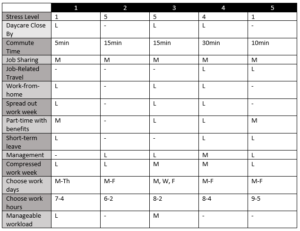
Stress is a real thing. Too much of it and your physical well-being can rapidly deteriorate. But just enough of it can produce eustress—a feeling of fulfillment and positive accomplishment.
We hear too often about the importance of work-life balance. Companies boast how they accommodate for varying lifestyles in their workplace. Phrases like “scheduling flexibility” and “remote work” let employees be in control of their lives.
Different workers have special needs and depending on the industry you work in, building a culture can be a challenge. But it’s a challenge worth tackling because studies show companies benefit from their employees productivity in a healthy working environment.
In the world of consulting, work-life balance is indeed an attractive perk.
What Values Do We Have?
When workers are balanced and happy, they are more productive, take fewer sick days, and are more likely to stay in their jobs. Naturally, organizations should strive to keep stress low. I asked some of my fellow co-workers what their stressors are and what ideal job setup would look like for them. The result was diverse to say the least.
I began by asking how stressed out their job was on a scale of 1 being not stressful at all, to a 5 meaning super stressful. I then asked on varying topics if changes were made whether that would make things more (M) or less (L) stressful for them.
The workers in question worked in a support center for management consultants in varying degrees.

The first commonality of the survey is on family and how important it is to be close to them in case of emergencies and for easy drop-off and pick-ups. Best-selling author Keith Ferazzi said in his book “Never Eat Alone” that the three most important things to any single person is his/her health, wealth and children.
Any employer that can appeal to those three values has won a devoted worker.
A second commonality is the aversion to job-sharing, i.e. splitting the workload. The high stress justification is because of the complex nature of work in the consulting world. To train someone new in the role would slow down progress in the short-run, with no guarantees that the new person would catch on or stick around.
There’s definitely a cultural history in America that citizens take pride in being independent. They enjoy having ownership in their job position, and sharing that space with others can be threatening.
The third commonality is the work day choice of Monday – Friday. Saturdays and Sunday’s are sacred days to plan non-work activities. As one person reported, her schedule revolves around her children. In that sense, a work schedule for a mother is most effective when it aligns with a school schedule. The two entities are intrinsically linked because of the people that embody them: parents and children.
How Else Can We Measure Our Balance?
Are you winning or losing today? Did you achieve what you set out to accomplish? Perhaps one of the biggest stressors in our work is reaching a competent level of productivity that we are personally satisfied with.
Getting everything done in a certain timeframe, staying on top of emails and paperwork, and clearing out those daily tasks are examples of productivity. Each person has a different definition of what it means to be productive for them.
On the flipside, where is your happy-place? What activity do you partake in to be happy? Perchance you enjoy spending time with your baby, or working out at the gym. What about listening to music or salsa dancing at the club?
Maybe it is work. Some people choose to live to work, instead of working to live.
At the end of the day, you will need to recognize what works and doesn’t work for your personal well-being. There’s no silver bullet to solving all problems with a single employer. But at least in the consulting world, employees get the luxury to set their own schedules to accommodate everything else.
